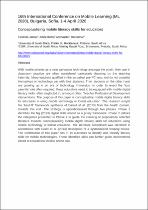JavaScript is disabled for your browser. Some features of this site may not work without it.
- ResearchSpace
- →
- Research Publications/Outputs
- →
- Conference Publications
- →
- View Item
| dc.contributor.author |
Jahoor, F

|
|
| dc.contributor.author |
Herselman, Martha E

|
|
| dc.contributor.author |
Botha, Adèle

|
|
| dc.date.accessioned | 2020-08-24T10:43:57Z | |
| dc.date.available | 2020-08-24T10:43:57Z | |
| dc.date.issued | 2020-04 | |
| dc.identifier.citation | Jahoor, F., Botha, A. & Herselman, M.E. 2020. Conceptualizing mobile literacy skills for educators. In: 16th International Conference on Mobile Learning (ML 2020), Bulgaria, Sofia, 1-4 April 2020 | en_US |
| dc.identifier.isbn | 978-989-8704-16-0 | |
| dc.identifier.uri | https://www.mlearning-conf.org/wp-content/uploads/2020/04/Program_ES_IS_ML_2020.pdf | |
| dc.identifier.uri | DOI: 10.33965/ml2020_202004L007 | |
| dc.identifier.uri | http://www.iadisportal.org/digital-library/conceptualizing-mobile-digital-literacy-skills-for-educators | |
| dc.identifier.uri | http://hdl.handle.net/10204/11560 | |
| dc.description | Presented in: 16th International Conference on Mobile Learning (ML 2020), Bulgaria, Sofia, 1-4 April 2020. Due to copyright restrictions, the attached PDF file contains the abstract of the full-text item. For access to the full-text item, please consult the publisher's website. | en_US |
| dc.description.abstract | With mobile phones as a near pervasive technology amongst the youth, their use in classroom practice are often considered particularly daunting by the teaching fraternity. Many teachers qualified in the so-called ‘pre PC’ era, and do not consider themselves on technology par with their students. Their students on the other hand are growing up in an era of technology immersion. In order to enact the ‘loco parentis’ role often required, these educators need to be equipped with mobile digital literacy skills; often neglected in, amongst other, Teacher Professional Development interventions. The purpose of this paper is conceptualize mobile digital literacy skills for educators in using mobile technology in formal education. The research exapts the ‘best-fit’ framework synthesis of Carroll et al. (2013) from the health domain, towards this end. The strategy is operationalized through two phases. Phase 1 identifies the Ng (2013) digital skills model as a priory framework. Phase 2 utilizes the categories presented in Phase 1 to guide the classing of purposefully selected literature towards conceptualizing mobile digital literacy skills for educators using mobile technology in formal education. The literature considered was identified in accordance with Grant et al. (2014) description of a systematized scoping review. The contribution of this paper lies in its outcomes to identify and classify literacy skills for mobile technologies. These identified skills can further guide interventions aimed at educational mobile phone use. | en_US |
| dc.language.iso | en | en_US |
| dc.publisher | IADIS | en_US |
| dc.relation.ispartofseries | Workflow;23617 | |
| dc.subject | Digital literacy | en_US |
| dc.subject | Mobile devices | en_US |
| dc.subject | Mobile digital literacy skills | en_US |
| dc.title | Conceptualizing mobile literacy skills for educators | en_US |
| dc.type | Conference Presentation | en_US |
| dc.identifier.apacitation | Jahoor, F., Herselman, M. E., & Botha, A. (2020). Conceptualizing mobile literacy skills for educators. IADIS. http://hdl.handle.net/10204/11560 | en_ZA |
| dc.identifier.chicagocitation | Jahoor, F, Martha E Herselman, and Adèle Botha. "Conceptualizing mobile literacy skills for educators." (2020): http://hdl.handle.net/10204/11560 | en_ZA |
| dc.identifier.vancouvercitation | Jahoor F, Herselman ME, Botha A, Conceptualizing mobile literacy skills for educators; IADIS; 2020. http://hdl.handle.net/10204/11560 . | en_ZA |
| dc.identifier.ris | TY - Conference Presentation AU - Jahoor, F AU - Herselman, Martha E AU - Botha, Adèle AB - With mobile phones as a near pervasive technology amongst the youth, their use in classroom practice are often considered particularly daunting by the teaching fraternity. Many teachers qualified in the so-called ‘pre PC’ era, and do not consider themselves on technology par with their students. Their students on the other hand are growing up in an era of technology immersion. In order to enact the ‘loco parentis’ role often required, these educators need to be equipped with mobile digital literacy skills; often neglected in, amongst other, Teacher Professional Development interventions. The purpose of this paper is conceptualize mobile digital literacy skills for educators in using mobile technology in formal education. The research exapts the ‘best-fit’ framework synthesis of Carroll et al. (2013) from the health domain, towards this end. The strategy is operationalized through two phases. Phase 1 identifies the Ng (2013) digital skills model as a priory framework. Phase 2 utilizes the categories presented in Phase 1 to guide the classing of purposefully selected literature towards conceptualizing mobile digital literacy skills for educators using mobile technology in formal education. The literature considered was identified in accordance with Grant et al. (2014) description of a systematized scoping review. The contribution of this paper lies in its outcomes to identify and classify literacy skills for mobile technologies. These identified skills can further guide interventions aimed at educational mobile phone use. DA - 2020-04 DB - ResearchSpace DP - CSIR KW - Digital literacy KW - Mobile devices KW - Mobile digital literacy skills LK - https://researchspace.csir.co.za PY - 2020 SM - 978-989-8704-16-0 T1 - Conceptualizing mobile literacy skills for educators TI - Conceptualizing mobile literacy skills for educators UR - http://hdl.handle.net/10204/11560 ER - | en_ZA |






